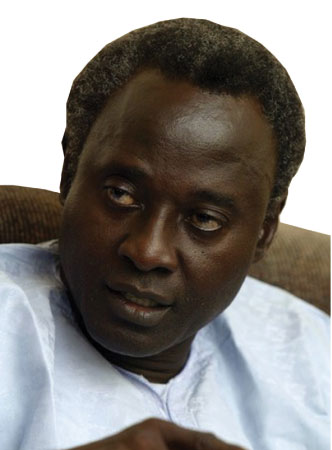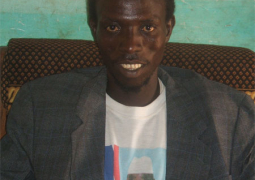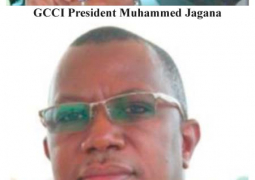
I am compelled by necessity to change my decision not to have polemics with any opposition leader in public and respond to OJ’s call for the Opposition to apologise to the people because of the trend that is developing in the media which may ultimately lead to the contradictions of the first republic between PPP and PDOIS.
This is the Second Republic. APRC is in office and not the PPP which has never put up a candidate for any office for the past decade. As far as I am concern, all members of the PPP Government of the first Republic should now be elderly statesmen and women who may either play a mediating role among the opposition to promote progressive democratic change or remain politically neutral like Jawara who has an office which is allocated 5 Million Dalasi annually and is paid D52, 000 monthly as an ex president. There is no doubt that if he continues to maintain his neutrality any new Government would also maintain the same practice thus giving an incentive for Presidents to be honest and not have any fear of loosing office. At least, this is lesser in expenses than having corrupt presidents who struggle to remain in office for life.
Why has OJ lost focus?
The opposition parties and international observers who were present during the Presidential campaign and the election have all concluded that the abuse of incumbency is the main problem of the electoral system in the Gambia and unless this is nipped in the bud and the constitutional, institutional and administrative defects it had caused are fully remedied, a free and fair election in the Gambia cannot be guaranteed.
OJ who stayed in Europe until two days before the election is claiming that the Opposition is the problem and should be penitent for their alleged folly in not accepting his advice. In short, OJ is inciting hatred against an opposition which is at peace with itself and the Gambia people at large for a remarkable performance that made the incumbent and his camp jittery. OJ is diverting the attentions from the wrongdoings of the ruling party and focusing attention and casting blame on the opposition. In this respect, he is helping the ruling party and harming the opposition. This is the first point.
Secondly, since the establishment of the United Front and the UDP led Alliance no one has heard any opposition leader attacking the other in the media. They had focused on issues rather than personalities. When the two sides met in URR during the campaign period they embraced each other and wished each other well. Interestingly, it is only OJ who has written so far trying to prove that he was correct and others were wrong without offering any evidence to back how history has absolved him. In this respect too OJ has departed from the frontiers of National Interest and has sunk into ego centric frontiers. For the sake of National Interest all opposition parties focused on the ruling party during the campaign and did nothing to damage each others chances. Now OJ is doing everything to damage the opposition in this country by claiming that it is its own cause of electoral failure. In my view, he drew such conclusion because he has lost focus. In short, a person who is focused would not dwell on subsidiary issues while closing one’s eye on the fundamental aspects.
What should have been his focus?
The answer is simple. The main reason why opposition parties are dictated by necessity to sit down and negotiate how to establish a United Front is the undemocratic decision by the incumbent to utilise their parliamentary majority to amend the Constitution to eliminate the second round of voting. Hence if two or three popular candidates among the opposition stand they would divide the votes of the opposition and the incumbent could easy win an election. On the other hand, if the second round is constitutionally provided for it becomes advantageous to have many popular candidates to stand so that the incumbent would be deprived of more than 50 percent of the votes. In this way the person with the second largest votes could unite with the rest to defeat the incumbent. Hence forging alliances is not a principle but a tactic that is applicable in given situations. Alliances also have forms and each party has a duty to decide which form of alliance is most suitable for it. OJ has said that the most suitable form of alliance for him was the UDP led alliance and went on to say that Hamat had said that he would not join an Alliance he would not lead and that Halifa had stuck to his Agenda 2011 idea. According to him, he decided not to join any alliance and left the country until few days before an election to come and cast his vote for the candidate of his choice. This again shows that OJ prefers to write history as he wants it to be interpreted to absolve himself for dereliction of national duty and not as it actually happened, which would have clearly led to his historical indictment, thus obliging him to make a historical apology to his colleagues and the Nation at large. My honest opinion is that OJ found it inconvenient to focus on the facts and thus preferred to write fiction.
What is the true historical account?
The answer again is not complex. Despite the fact that PDOIS had called for a United Front for a period of three years when the UDP called for a meeting, barely three months before the presidential poll, to examine how to establish it, 7 opposition parties, including PDOIS, participated.
At the beginning of the talks in September, the UDP put across its proposal for a UDP led Alliance, which would give birth to a UDP led Government and a UDP majority seats at the National Assembly. There was complete tolerance and respect for divergent views.
It is not my prerogative to say what others like the NRP, GPDP, GMC and NADD representatives said. Since OJ mentioned my name and PDOIS’ position, it is necessary to clarify issues. OJ would recall that when the UDP proposed for a UDP led alliance that would enable it as the major party to establish a government, control the National Assembly and accommodate the ‘minor” political parties in cabinet and the National Assembly, I reacted by saying that if the UDP could win an election on the basis of such an alliance we had no objection in being an opposition patty under its rule. I emphasised that the facts on the ground as we in PDOIS saw it offered no possibility for any single party on its own platform or personality on one’s own merit, to win an election against the incumbent.
I indicated that to win an election we had to win over the support of those who were apathetic and those who supported the ruling party. I argued that a party led alliance would not be able to achieve that purpose. We made it clear that if one had a yellow box representing the UDP and a green box representing the APRC, those who would ordinarily vote for the UDP or the APRC would do so respectively. Those who would abstain would also do so. This was not a recipe for change.
PDOIS therefore proposed that we should put party loyalty aside and hold a convention to select one candidate who would head a transitional government that would serve only one five year term and hand over to a democratically elected government. In short, the transitional government would have the mandate to restore a multi party system that would lead to free and fair election that will not be contested by any incumbent. Hence there will be no abuse of incumbency. OJ is on record saying that a convention would have been the best instrument to determine a flag bearer but claimed that money and time did not permit us to take that route.
As the debate unfolded, PDOIS even proposed that the party which claims to have a majority could rely on the results of previous elections to demand for a larger representation than the rest at a convention held to elect a flag bearer. We even indicated that even though we could offer the United Front a credible candidate we may not particularly insist in putting up a candidate. What is most disappointing, OJ left the country to go abroad when the debate was still on. A lot of damage to the opposition was done by diverting the attention of the Diaspora to the essence of the debate as to which tactic was more likely to succeed and focus was put on the alleged conflict of personal interests and idiosyncrasies. The opposition and not the ruling party, which removed the second round of voting, was vilified.
Has History Proven OJ Right?
History teaches that at the end of our discussion a motion was put for a convention to be held to select a flag bearer. Five parties out of seven endorsed the convention. Only OJ’s representative indicated his support for a UDP led Alliance.
Eventually, GMC indicated that it was misrepresented and expressed its support for a UDP led Alliance. OJ also disowned the position of his representative at the talks and took a neutral position, despite the fact that many people considered the PPP and The GMC to have been allied to the UDP.
The end result is that a Convention was held despite OJ’s claim that time and resources would not permit its holding. A flag bearer was selected without any difficulty. The flag bearer also abandoned his position on a Party led United Front and accepted to be an Independent Candidate so that many people who would not ordinarily vote for him and his party would give him their support. OJ does not have any justification to criticise Hamat for initially stating that his party should lead an Alliance. He has accepted to subject himself to a free and fair election to be a candidate of a United Front and had accepted to leave his party to be an Independent Candidate, despite a vicious campaign by a Lawyer in the Diaspora who did everything to have his candidature rejected by the IEC.
The UDP also went on with its Alliance and did hold its ground.
Most Gambians have agreed that the Campaign of the opposition was so effective that the incumbent no longer took victory for granted. He was just lucky that the Campaign period was short and the business community and the state resources gave him financial edge over the inadequately financed United Front.
The results are now out. UDP had 114,000 votes and 17 percent of the total votes cast. Its 2006 total has increased by 9000 votes. The United Front had 73,060 votes. The total number of votes NADD had in 2006 was 23,000 votes. The United Front has increased the number of votes as compared to NADD by 50,000 votes. Hence the incumbent must now be wary that a Convention could give rise to a formidable political opponent in election.
What then is the lesson that forces in the opposition that genuinely want change should learn?
The answer is a simple one.
The combined votes of the opposition in 2006 were 128,000 votes. The total number of the votes in 2011 is 183, 000 votes. The number of votes has increased by 55,000 votes. Over 45,000 of the votes were added by the United Front. Hence history has proven that a convention is a viable instrument to select a flag bearer in the absence of a second round of voting. This fact is incontrovertible.
History has therefore proven OJ wrong. The whole world is now calling for electoral reforms in the Gambia so that the second round of voting would be restored, the abuse of incumbency restrained and a more level ground for multiparty contest created before the National Assembly elections. OJ is best served to endorse the initiative which is borne by our practical participation in the process instead of sitting at a distance just to end up being a penitent observer of events after they have happened.
In my view, there is no basis to caution opposition parties regarding the consequences of division in fielding National Assembly candidates. Both the UDP Alliance and the United Front could be said to have acted in good faith thinking that the steps they had taken would yield the desired results. Such good faith has not given rise to any animosity during the campaign. I do not see how it could generate animosity after the opposition has seen with their naked eyes the electoral outcome of the omnipotence of an uncontrolled and unrestrained exercise of the power of incumbency in the face of a short campaign period and inadequate financial support. I am confident that each alliance has the mature leadership that would act in accordance with the enlightened interest of the people. Needless to say , despite the fact that it s likely that parties are going to contest parliamentary seats the voters should put their party allegiances aside and vote for candidates on the basis of merit.
In my view, OJ could best leave a legacy by being a constructive retired politician rather than be a judgmental reservist political player. On my part, even though I may not be able to resist a determined pressure for me to stand as a candidate in the National Assembly elections, what would have been best is for me to work on party building, develop language skills to be able to speak Fula, Jola, Serahule, French and Arabic fluently, transform my manuscripts into books and may be even link to Universities to get PHD in Sociology and Economics before engaging the APRC in full force in 2016. If the public could have given me this respite without feeling that I have abandoned them, I would clearly attain all I want to attain in life in these five years and devote the rest of my life to their civil, political, economic, social and cultural emancipation. Will this be possible? Time will tell.



